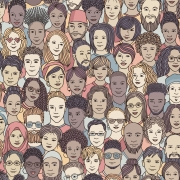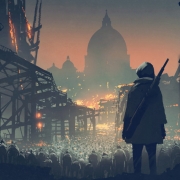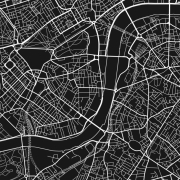It has become steadily clearer to me that alienation is one of the determining realities of the contemporary age. . . By alienation I mean the state of mind that can find a social order remote, incomprehensible, or fraudulent; beyond real hope or desire; inviting apathy, boredom, or even hostility. The individual not only does not feel a part of the social order; he has lost interest in being a part of it. For a constantly enlarging number of persons, including, significantly, young persons of high school and college age, this state of alienation has become profoundly influential in both behavior and thought.”
In a recent review of Patrick Deneen’s book on the failures of Liberalism, (a book which may not be agreeable in total), Sam Goldman concludes:
Deneen is probably right that the demand for an ideological replacement for liberalism is not only distinctively modern, but actually part of the problem. In seeking out a course beyond liberalism, we may find ourselves in a position that more closely resembles that of the ancients, who did not possess—and did not generally seek—a comprehensive political and moral doctrine.
Whether one finds fault with the difficult-to-define project of “liberalism,” the point still stands: constructing a socio-political framework for our human future is not the sole way out. This makes the mistake of presuming that the health of society is a result of a comprehensive and shared vision. In truth, naturally arising social context must come first, it is the soil in which the fruit trees can grow. In the words of Robert Nisbet (Quest for Community):
The family, religious association, and local community—these, the conservatives insisted, cannot be regarded as the external products of man’s thought and behavior; they are essentially prior to the individual and are the indispensable supports of belief and conduct. Release man from the contexts of community and you get not freedom and rights but intolerable aloneness and subjection to demoniac fears and passions.
Society, Burke wrote in a celebrated line, is a partnership of the dead, the living, and the unborn. Mutilate the roots of society and tradition, and the result must inevitably be the isolation of a generation from its heritage, the isolation of individuals from their fellow men, and the creation of the sprawling, faceless masses.
What we learn from all this is that our strategy may be found in the opposite of our modern inclination. Consider the following suggestion: we may not need a mere mob of more voices on behalf of a better ideology at the expense of the actual development of the roots that are required for civilization to rest on solid ground.
The social mood of our late stage democratic progressivism puts a particular emphasis on the primacy of political involvement, politicized chatter, and the sham of making “your voice be heard.” There is a general atmosphere that encourages one to think in terms of creating a movement, of overcoming the power elite, of rallying the proverbial militia, of changing hearts and minds of the world around us.
But imagine, if you will, the sheer audacity of traveling back in time to the degenerative collapse of the Roman world and rallying a handful of people to tell their neighbors about the Good News of Lockean-style private property rights. What is being posited here is certainly not a plea to ignore ideas, but rather, to direct and preserve them in more meaningful, even self-fulfilling ways.
One must consider finding fulfillment and satisfaction in a completely different civilizational role than that of a visible hero. To echo Warren Harding’s campaign speech on a slightly different context, we need, at a personal level, to “return to normalcy:”
America’s present need is not heroics, but healing; not nostrums, but normalcy; not revolution, but restoration; not agitation, but adjustment; not surgery, but serenity; not the dramatic, but the dispassionate; not experiment, but equipoise;
Such a return to normalcy must be motivated in a change of personal perspective. We must learn to love the everyday; to cherish the mundane; to appreciate the regular; to invest time and happiness in the ordinary. This is the long-lasting and measurable path forward. A people that find their sole identity in the fight against the zeitgeist will so often find that the fight came at the expense of the truly meaningful elements of our person. And the negative effects of non-meaningful political identities have negative effects on those that come after us, long after we draw our last breath.
Indeed, as Nisbet writes:
the major moral and psychological influences on the individual’s life have emanated from the family and local community and the church. Within such groups have been engendered the primary types of identification: affection, friendship, prestige, recognition. And within them also have been engendered or intensified the principal incentives of work, love, prayer, and devotion to freedom and order.”
Each of us tend to flatter ourselves that we will follow in the footsteps of Cato the Younger or Ron Paul, yet the odds are unfavorable that this is the role for our personal taking. Thus, it is high time that we come to terms with the suggestion that we might take up a similar function of the Celts in those dark years in the vacuum of Rome’s former glory.
Rather than a pursuit of some vague agenda of saving the world, the Irish monks, as told in Thomas Cahill’s How the Irish Saved Civilization, took the path of restoration and preservation on the home front— their scribes took it upon themselves to collect, copy, and preserve the literary contributions of a world that was quickly slipping away. In an age of barbarianism, anti-intellectualism, and revolt against civilization, the role of St. Patrick and the monks he inspired was to act as a silent medium through an era of cultural darkness.
For, as the Roman Empire fell, as all through Europe matted, unwashed barbarians descended on the Roman cities, looting artifacts and burning books, the Irish, who were just learning to read and write, took up the great labor of copying all of western literature—everything they could lay their hands on. These scribes then served as conduits through which the Greco-Roman and Judeo-Christian cultures were transmitted to the tribes of Europe, newly settled amid the rubble and ruined vineyards of the civilization they had overwhelmed.
Without this service of the scribes, everything that happened subsequently would have been unthinkable. Without the mission of the Irish Monks, who single-handedly rebounded European civilization throughout the continent in the bays and valleys of their exile, the world that came after them would have been an entirely different one—a world without books. And our own world would not have come to be.
And Kenneth Clark, in his chapter “The Skin of Our Teeth,” in his own Civilisation writes:
Looking back from the great civilizations of twelfth-century France or seventeenth century Rome, it is hard to believe that for quite a long time—almost a hundred years—western Christianity survived by clinging to places like Skellig Michael, a pinnacle of rock eighteen miles from the Irish coast, rising seven hundred feet out of the sea.
Their objective was far from hoisting a civilized society back on to the then-dead Roman society, it was rather to be faithful in the small things; to accomplish some obtainable and something accessible. In the scheme of things, the Irish saved civilization because they became the living preservation of the elements of goodness taken from Rome in decay.
From their activities of preservation came forth the eventual outward growth and spread of these memories via an impressive chain of monasteries from Ireland back through continental Europe and blossomed into the roots of the soil of what would one day be European civilization. Literature, art, religious writings, history, records, all the recordings of Roman life were transferred across time via the Irish monks.
This is all analogy, of course. We do not need to run for the caves, build fortresses in the mountains— but the analogy is obvious: in a world of politicization, the most prudent use of our time is not to be another voice in the crowd. Even Jesus said as much: “Do not give what is holy to the dogs; nor cast your pearls before swine, lest they trample them under their feet, and turn and tear you in pieces.”
What, in our context, might it look like to hunker down and hold to a mentality of preservation, to “save the books,” rather than reshape the present world? One thing in particular would be to restore, in our personal lives, the social primacy of the family. This is immediate, it is measurable, it is meaningful, and it is long-lasting. It is quite remarkable that such suggestion might come off as a bland and out of fashion in our age of individual liberation.
And yet, the idea of family—the idea of a partnership between those who have passed on, those currently living, and those yet to be born—this is itself a proven model that can act as a via media, or a conduit, if our goal is the preservation and promulgation of the goodness of civilization. These goods, what TS Eliot and Russell Kirk called “permanent things,” must be passed on in a world dominated by the enemies of permanent things.
In our time, our strategy must be to turn back toward the home, a shelter from the broken and loney world around us. In a world of upheaval, there is solace and meaning in the activities of raising a family. The greatest legacy that many of us will pass on are those of our own flesh and blood. The opportunity that we get to impart our own memories and passions, wisdom and insight, habits and prejudices, to the next generation is made manifest in the raising of a family. In a Progressivist world that downplays the importance of the family and sings the praises of alternative arrangements, few things are more important—but certainly not political activity— than just being a dedicated spouse and parent.
Far from defeatism, there rests a very real sense of hope in walking away from the primacy of the political and tending to the care and development of one’s children. To be a voice in the crowd will likely change no one; to be parent is to homestead a living being that can embody the very things worth passing forward to the world unknown. Our friend Nick Hankoff recently offered pushback against a particular phenomenon among libertarians, writing a piece in the Daily Caller titled As Long As Libertarians Reject Traditional Institutions, They’re As Doomed As America:
The only way to correct the inevitable failure of the libertarian movement is through a deeper appreciation and love for family, church, community, and nationality. For too long, these centers of civic life that strengthen the individual and diminish the state have been neglected.
To the detriment of their cause, some libertarians sneer at these social structures and retreat to more familiar ideological territory. The individual owns himself and has natural rights, yes. But he is also the product of his family, religion, and communities.
If you want to have a role on the future, something measurable and something identifiable to your own hand, stop trying to change the world. Go home and hug your kids. If you don’t have any, get married and make some. Homeschool them, if at all possible. Enjoy them. Teach them. Impart the memories and customs of your past—their past—onto their soul, that they might bring them forward to posterity. Make them read— most kids can’t; make them write—still fewer know how.
Raise boys to be men. Raise girls to be women. This is the new counter-cultural. But it is the foundation of culture.
Don’t envision yourself as a hero of world change and bringer of hope to the world. Be a father or mother. Be a hero to your family. Gramsci had his long march through the institutions. It’s time for our long march through Main Street.
To leave a legacy, first look homeward.
It must be remembered that we the living are the catalyst bringing the past to the future.
We must be vigilant to treat this duty with care, for we are our children’s present and tomorrow we will be their past.
C.Jay Engel is the founder and publisher of Bastion Magazine.













